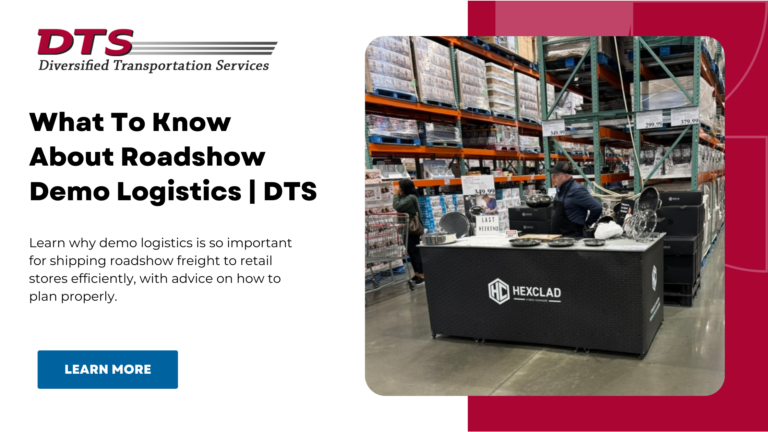
If your business is planning to run product demonstrations at retail stores, locally or nationally, understanding demo logistics is vital for transporting goods safely. But what does it involve? And what are the most important factors to consider when preparing to ship goods?
In this guide, we’re exploring the key details you need to know about shipping your roadshow freight.
Demo logistics refers to the process of shipping/freight services for businesses that set up product or sales demonstrations in popular retail locations. Demos are common in stores like:
Product and sales demonstrations provide businesses with a fantastic opportunity to showcase goods directly to customers. This can be a great way to boost brand awareness and make a positive first impression.
However, businesses conducting in-store demos need reliable transportation to move booths and equipment safely and efficiently. This is where working with a demo logistics provider can be a major advantage.
Partnering with the right provider ensures that your roadshow setup will reach the right store on time and in perfect condition, ready to help you attract new customers.
In-store demonstrations are especially effective for businesses that benefit from giving customers hands-on experience with their products. Depending on the item featured in a demo, customers may be invited to try it for themselves (think sampling new food or using an appliance).
You’ll commonly see businesses across the following industries using demo logistics to transport their roadshow materials to stores:
When preparing to ship your demo setup to stores, consider the following factors carefully:
All demo products must be shipped to stores well in advance of the scheduled demo date. Keep backup stock available in case of high demand or unexpected damage during transit — this could mean the difference between making and losing sales. Always coordinate with store managers to confirm shelf space and storage availability.
Only use reliable and reputable carriers with tracking capabilities when organizing demo logistics to avoid delays. Any issues that prevent your roadshow setup from reaching a store could lead to wasted time and missed opportunities to generate sales.
Factor in extra time for things that could cause shipping disruptions, like extreme weather, customs, and peak retail seasons.
Your demo products and other materials should arrive at each store securely, minimizing the risk of damage and ensuring they’re ready to set up immediately. To prevent harm to goods in transit, always use protective packaging — this is especially important for fragile items (like glass containers or electronics.)
You should also label shipments clearly with the relevant store details, demo date, and any special handling guidelines needed. Include all relevant demo materials in the shipment, such as instructions, display stands, and signage.
When you arrange to hold a demo in a store, study the retailer’s guidelines carefully and always adhere to their requirements. These should cover:
Crucially, all demo staff must know in-store safety regulations and hygiene requirements for everyone’s peace of mind (especially for food and beverage demos.)
If you plan to offer product samples, verify any necessary permits or compliance requirements. This is particularly important for food, beverages, and pharmaceuticals.
All equipment required for demos, such as display tables, audio/visual gear, and cooking appliances, must be shipped well ahead of time. So, you should test all equipment beforehand to avoid last-minute technical issues that could cause delays and create a negative first impression.
If your demo event is scheduled to run across multiple days, plan for all materials to be stored safely between shifts.
Any leftover inventory and demo items that can be reused should be shipped back to you. Keep detailed records of inventory movement to help you plan future demonstrations.
Preparing for your next demonstration can be complex and challenging, especially when dealing with key retailers for the first time or shipping roadshow freight over long distances. If that sounds overwhelming for your business, try working with an experienced shipping logistics company for demo logistics.
At DTS, we have over 35 years of experience helping businesses of all sizes transport goods efficiently, and we offer different retail shipping options to help ensure everything required for demos reaches stores on time. To get a quote for your business, contact us today.
Whether you're a company looking to improve one facet of your supply chain, your entire supply chain, or simply looking for a transportation and logistics consultation, we can help.